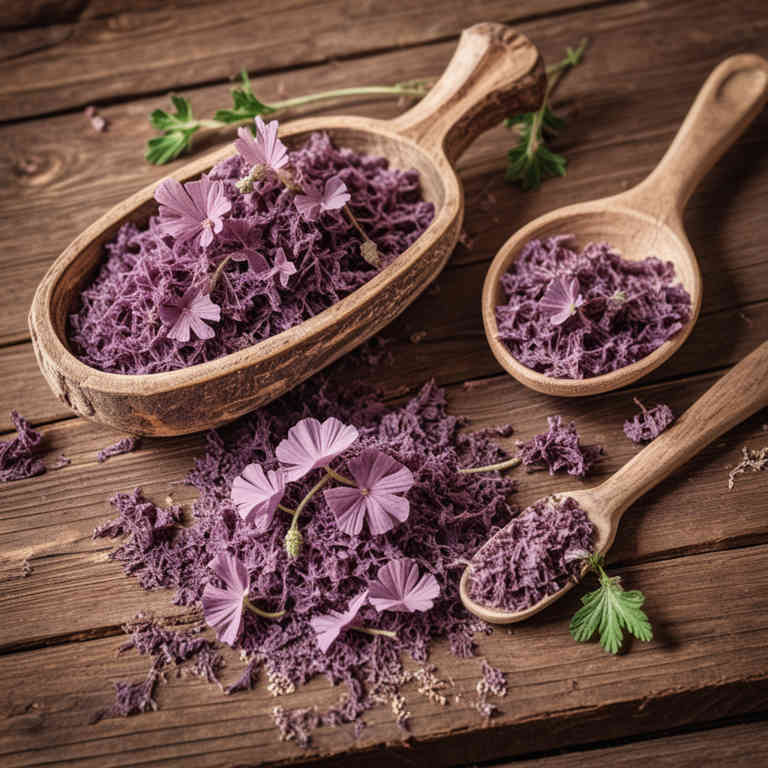Malva sylvestris mucillage for medicinal use

Malva sylvestris mucillage is a viscous, gel-like substance derived from the plant Malva sylvestris, commonly known as the wild mallow.
This preparation is obtained by soaking the leaves or flowers in water to extract the mucilage, a type of soluble fiber. In herbalism, it is valued for its soothing and demulcent properties, which help to calm irritated tissues in the digestive and respiratory systems. It is often used to alleviate symptoms such as sore throats, coughs, and gastrointestinal discomfort.
The mucilage's ability to form a protective layer over mucous membranes makes it a popular remedy in traditional herbal medicine.
Uses
Malva sylvestris mucillage has been used to treat respiratory and digestive ailments for centuries.
Historically, it was valued in ancient Greek and Roman medicine for its soothing properties, particularly for coughs and sore throats. In traditional herbal practices, it was also used to alleviate inflammation and as a demulcent to protect and soothe mucous membranes. Modern applications include its use in herbal remedies for conditions like bronchitis, gastritis, and as a natural thickener in food products.
Today, it is still appreciated for its mild, mucilage-rich properties that support digestive and respiratory health.
Benefits
Malva sylvestris mucillage has health benefits such as soothing inflammation, promoting digestive health, and supporting respiratory function.
It is rich in mucilage, a gel-like substance that coats and protects mucous membranes. This preparation is often used to alleviate symptoms of coughs, sore throats, and gastrointestinal irritation. Its mild and calming properties make it suitable for various internal and external applications.
Additionally, it may help in reducing skin irritations and promoting wound healing.
Constituents
Malva sylvestris mucillage active constituents include mucilage, flavonoids, tannins, and polysaccharides.
These components contribute to its demulcent and anti-inflammatory properties, making it beneficial for soothing irritated mucous membranes. The mucilage forms a protective layer over the lining of the digestive tract, aiding in the relief of gastrointestinal discomfort. Flavonoids and tannins provide additional antioxidant and anti-inflammatory effects, supporting overall health.
This preparation is commonly used in herbal medicine to address conditions such as gastritis, coughs, and skin irritations.
Preparation
To make Malva sylvestris mucillage, begin by harvesting the leaves of the plant, preferably when they are young and tender, as they contain the highest concentration of mucilage.
Wash the leaves thoroughly and soak them in cold water for several hours or overnight to allow the mucilage to dissolve. Strain the liquid through a fine mesh or cheesecloth to separate the mucilage from the plant material. The resulting mucilage can be used directly or further concentrated by simmering gently over low heat.
This preparation is known for its soothing properties and is commonly used in herbal medicine for its demulcent and anti-inflammatory effects.
Side Effects
Malva sylvestris mucillage may lead to gastrointestinal discomfort, including bloating, flatulence, and loose stools, due to its high mucilage content.
It is generally considered safe when consumed in moderate amounts, but excessive use could cause stomach upset or interfere with nutrient absorption. Some individuals may experience allergic reactions, particularly those sensitive to plants in the Malvaceae family. Long-term use might contribute to digestive issues or interact with certain medications, especially those affecting the gastrointestinal tract.
It is advisable to consult a healthcare professional before using this preparation, especially for those with pre-existing medical conditions.